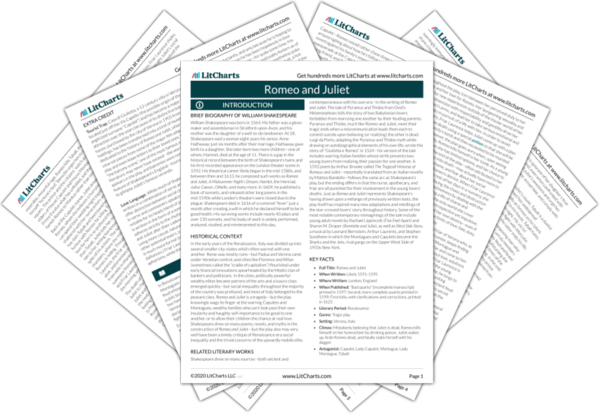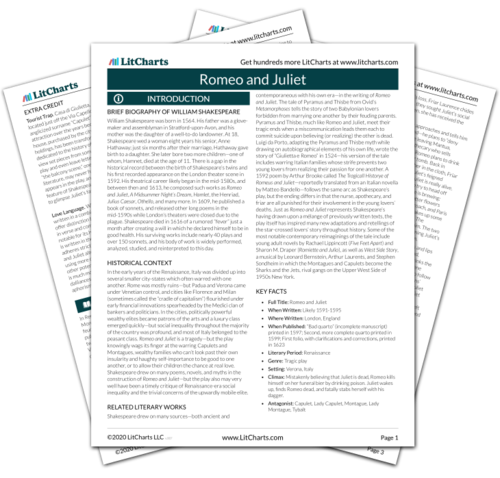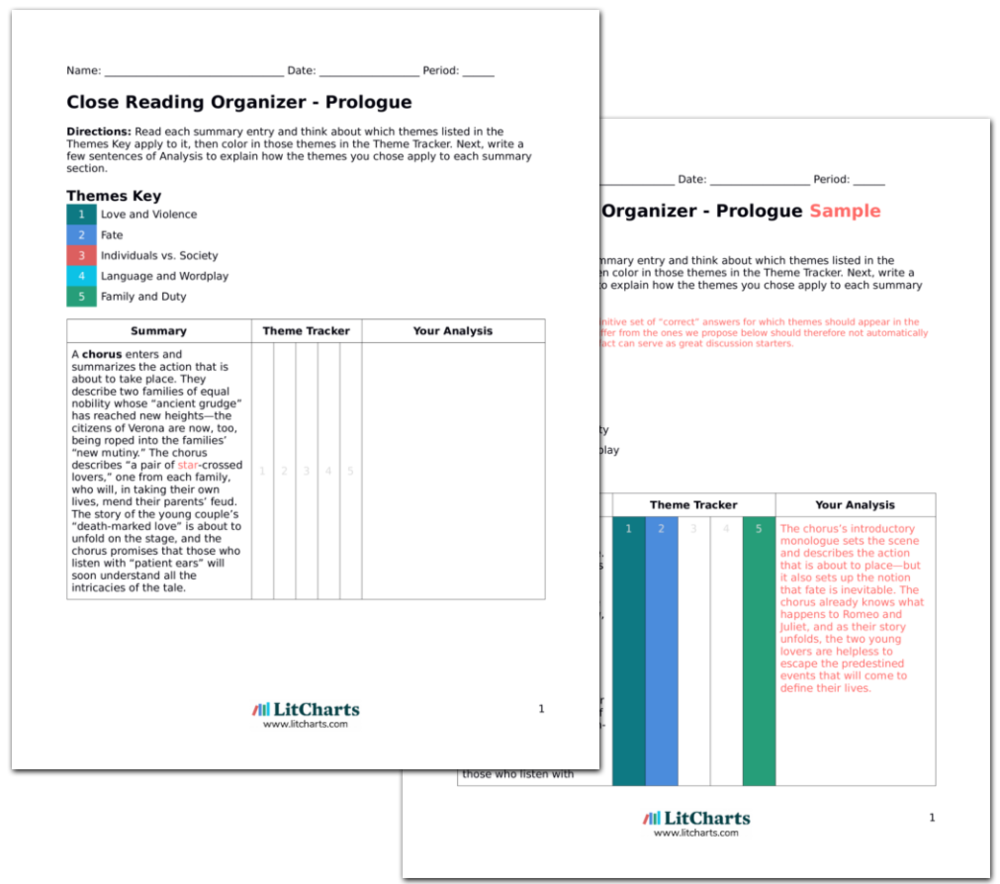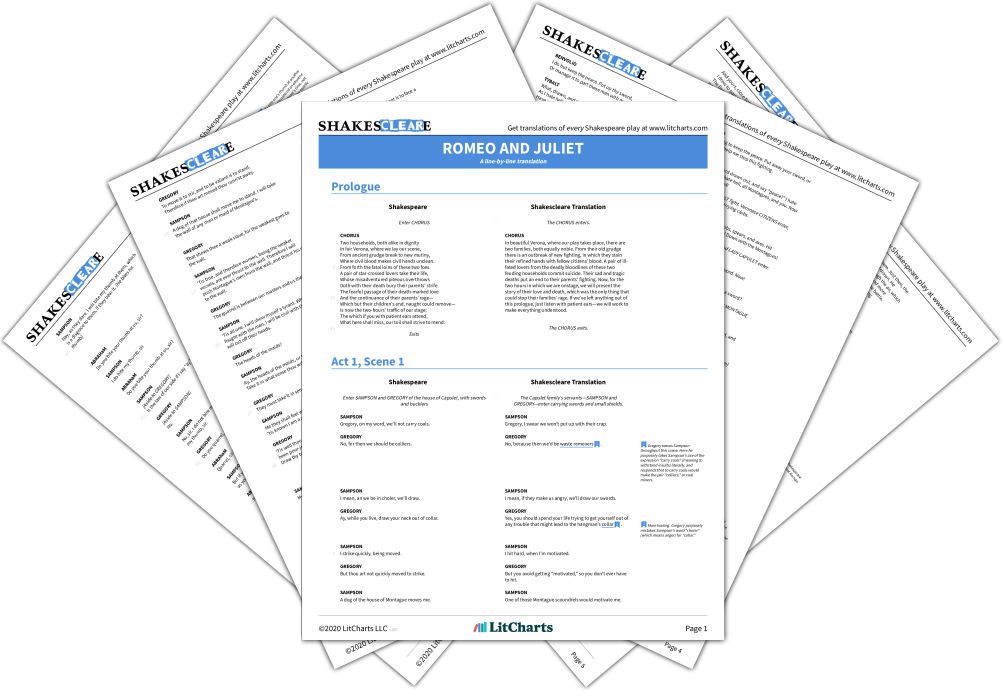![]()
LitCharts assigns a color and icon to each theme in Romeo and Juliet, which you can use to track the themes throughout the work.
![]()
![]()
![]()
![]()
![]()
Benvolio , Mercutio , and Mercutio’s page are out walking around Verona, but Benvolio begs Mercutio to lead them home. It is a hot day, he says, and on such days “mad blood” often stirs—in other words, people get worked up more easily. Mercutio states that Benvolio is secretly hoping for a fight, or any other chance to use his sword. Benvolio is surprised to hear himself characterized this way, but Mercutio goes on and on about how hot-blooded Benvolio really is, making jokes about Benvolio’s rampant sexual energy.
Even though Benvolio is actually worried about being seen around Verona given the instability in the air, Mercutio can’t stop cracking jokes. Mercutio is fun-loving and carefree as always, even in the face of Benvolio’s warnings that something bad may be about to happen.
Active Themes![]()
![]()
![]()
Tybalt , Petruchio , and some other Capulets approach. Benvolio warns Mercutio , but Mercutio is unconcerned by their presence. Tybalt approaches them and says he wants a word with the two of them—Mercutio urges Tybalt to couple his “one word” with a blow. Tybalt says he will, if the men give him reason to. Tybalt addresses Mercutio and asks if he “consort’st with Romeo.” Benvolio, nervous, suggests they all go to some “private place” where they can resolve their grievances without getting the public involved. Mercutio insists he won’t move for anyone. Romeo approaches, and Tybalt says his “man” has arrived. Mercutio, offended, rises to Tybalt’s taunt.
Tybalt’s verbal attacks against Mercutio are designed to taunt and play upon Mercutio’s own proclivity for sexual jokes and puns. The Elizabethan meaning of “consort” is to associate with—but also to engage sexually with—another person, while “man” connotes a servant or someone otherwise submissive. By essentially calling Mercutio a homosexual and implying he is attracted to Romeo, then, Tybalt is insulting both their masculinities—and Mercutio can’t help but rise to the bait.
Active Themes![]()
Tybalt turns on Romeo , mocking him and calling him a villain. Romeo tries to defuse Tybalt’s anger by calmly suggesting he move on. Tybalt, though, tells Romeo it is time for him to answer for the “injuries” he has done to Tybalt. Romeo says he’s never injured Tybalt, and in fact loves the Capulet man, whose surname he loves “as dearly as [his] own.” Mercutio , angered by Romeo’s “vile submission,” draws his sword. Tybalt draws his, too, and though Romeo begs them to stop, Tybalt and Mercutio begin fighting. Romeo tries to break up the fight, but Tybalt stabs Mercutio, reaching under Romeo’s raised arm as he does so. Petruchio drags Tybalt away from the fight, and Mercutio angrily wishes “a plague” upon the houses of both Capulet and Montague.
Romeo tries as hard as he can to defuse the tension between Tybalt and the Montagues, but his efforts are in vain. Though Romeo is willing to put aside their families’ grudge, he knows deep down that Tybalt would never do the same, even if he were to learn that the two of them were now legally kinsmen. Romeo’s desire to stop the fight is all in vain, and he may actually be responsible for Mercutio’s injury—had he not gotten in the way, Shakespeare seems to be suggesting, Mercutio might have been able to prevail. Mercutio, sick of always having to stand up for, comfort, and defend Romeo, shouts out that he is furious with both houses—their grudge has maimed him, and will soon be the cause of his death.
Active Themes![]()
![]()
![]()
![]()
After Tybalt and the other Capulets leave, Benvolio and Romeo ask Mercutio if he’s badly hurt. He insists at first that he’s suffered just “a scratch”—but moments later calls for a doctor. Romeo says the injury doesn’t look so bad, but Mercutio predicts that he'll be dead by tomorrow. He calls again and again for a plague on both Romeo and Tybalt’s houses, then asks Benvolio to take him inside where he can die in peace. Alone on stage, Romeo laments that he has allowed Mercutio, his closest friend and kinsman, to be murdered by a man who’s only been related to him for an hour or so. Romeo blames Juliet for his misfortune, claiming that her “beauty hath made [him] effeminate.”
Mercutio’s death scene is famous because of its brutality. As he dies, he doesn’t forgive Romeo or declare any florid final wishes—all he has left is vitriol, anger, and bitterness over how his life has ended. Mercutio, like his kinsman Prince Escalus, is fed up with the ways in which the Montagues and Capulets disturb the peace of Verona and bring misery unto its citizens—so, with his dying breaths, he curses them with misery, woe, disease, and death.
Active Themes![]()
![]()
![]()
"My students can't get enough of your charts and their results have gone through the roof." -Graham S.

Benvolio enters and announces that Mercutio has died. Romeo , enraged, states that “this day’s black fate” will begin a great “woe” between the Capulets and Montagues. Tybalt returns to the square and Romeo angrily approaches him, stating that one or the other of them must go join Mercutio’s soul in heaven. Tybalt sneers that as Romeo “didst consort with him here" on Earth, he should “consort” with him in heaven. Both men draw their swords and begin to fight—Romeo fells Tybalt, who quickly dies.
Romeo falls for Tybalt’s provocation just as quickly as Mercutio did. The insinuation of homosexuality—an accusation which assaults both men’s masculinity and is an even further affront in light of Mercutio’s death—makes Romeo’s blood boil just as it did Mercutio’s. Romeo knows that his marriage to Juliet means that Tybalt is his kinsman now—but Mercutio was Romeo’s best friend, and he must draw the lines of his loyalty somewhere.
Active Themes![]()
![]()
![]()
![]()
Benvolio warns Romeo that the citizens of Verona have heard the fight and are coming. Prince Escalus will kill Romeo if he hears of what he’s done. Romeo, lamenting that he is “fortune’s fool,” quickly runs away. The citizens’ watch enters, looking to arrest the man who slayed Mercutio , and Benvolio points out Tybalt ’s body on the ground. The prince enters with Montague , Capulet , and their wives. Lady Capulet screams and swoons over her dead kinsman, and the prince demands a detailed account of what has happened. Benvolio describes how Tybalt’s anger would not be calmed in spite of Romeo’s attempts to pacify him, then explains how the two brawls unfolded.
Benvolio knows that Romeo did not provoke the fight and even tried to stop it, so he urges his kinsman to flee before he can incur the prince’s wrath. The prince, whose own kinsman Mercutio has been felled in this latest brawl, is furious and determined to find out what happened—and to punish whomever went against his last decree.
Active Themes![]()
Lady Capulet accuses Benvolio of lying to protect the Montagues. Prince Escalus asks if Romeo is responsible for Tybalt ’s spilt blood. Montague begs the prince to spare his son’s life, and the prince agrees to merely exile Romeo. However, if the boy returns to Verona, he will be executed on the spot. Showing mercy to killers, he says, only leads to more murders.
Prince Escalus issued a decree in the play’s first act condemning anyone—Capulet or Montague—who disturbed Verona’s peace to death. Now, he is determined to make good on his promise, even if he knows that he cannot use the full weight of the law on Romeo, who was swept up in violence for which he didn’t ask.
Active Themes![]()
![]()
 version of the LitChart on Romeo and Juliet" />
version of the LitChart on Romeo and Juliet" />
“Would not have made it through AP Literature without the printable PDFs. They're like having in-class notes for every discussion!”
Get the Teacher Edition
“This is absolutely THE best teacher resource I have ever purchased. My students love how organized the handouts are and enjoy tracking the themes as a class.”
Romeo and Juliet in Plain English
“Every teacher of literature should use these translations. They completely demystify Shakespeare. Students love them!”
Copyright © 2024 All Rights Reserved Save time. Stress less.AI Tools for on-demand study help and teaching prep.
 Quote explanations, with page numbers, for over 44,324 quotes.
Quote explanations, with page numbers, for over 44,324 quotes. PDF downloads of all 2,003 LitCharts guides.
PDF downloads of all 2,003 LitCharts guides. Expert analysis to take your reading to the next level.
Expert analysis to take your reading to the next level. Advanced search to help you find exactly what you're looking for.
Advanced search to help you find exactly what you're looking for.
 Expert analysis to take your reading to the next level.
Expert analysis to take your reading to the next level. Advanced search to help you find exactly what you're looking for.
Advanced search to help you find exactly what you're looking for.